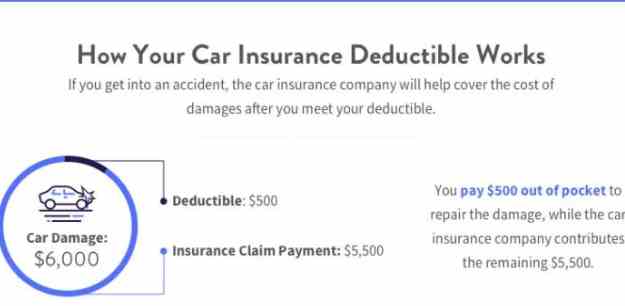When a disaster strikes your home or when you are involved in an automobile accident, the insurance deductible you pay will be deducted from the amount your insurance will contribute to a claim. Every time you submit a claim, you typically pay a deductible, which is deducted from the amount you get. To avoid paying up front, you can decide not to file a claim until you have the money to avoid incurring a car insurance deductible. Car insurance deductible is the amount you contribute to an accident .
What Is an Insurance Deductible?
An insurance deductible is the sum of money you are required to pay following an insured loss. It is the amount of money that will be deducted from the total amount your insurance policy contributes to a claim when a calamity strikes your house or you are involved in an automobile accident. The risk is divided between you, the policyholder, and your insurer through deductibles.
The less you pay in premiums for an insurance policy the higher the deductible is. A deductible can also be a set monetary amount or a percentage of the entire insurance coverage that a policy provides. You can find the terms of your coverage which determines the amount you will pay in a deductible on the declarations (or front) page of typical homeowners, renters, and vehicle insurance policies.
The text of the policy and the manner in which deductibles are applicable are strictly governed by state insurance rules. This means that states may have different versions of these laws.
When Do You Get the Deductible For Car Insurance?
When you submit a claim for coverage that has a deductible, you must pay your deductible to cover up the risk. Your deductible will normally be put into account when your insurance provider pays out after approving your claim.
Prior to paying the claim, the sum is paid. Collision and comprehensive insurance for cars are both subject to deductibles. A deductible’s regular cost often falls between $100 and $1000. The sum varies depending on the occurrence and the kind of insurance you have.
How To Avoid Paying Car Insurance Deductible
It is very difficult to avoid paying car insurance deductible as you must pay your deductible in order to receive payment from your insurance claim. You can avoid it by deciding not to file a claim if you don’t currently have the funds. For instance, you might wait a little while to submit a claim if your automobile is still driveable after an accident but only has minor aesthetic damage. In this manner, you can accumulate the deductible sum before filing a claim. However, if you are still unable to pay your deductible, you have the following options:
#1. Examine Your Policy
Knowing your policy’s specifics is always crucial when it comes to deductibles. Some insurance providers do not demand that you pay your deductible in full up front. These businesses are ready to deduct your deductible directly from the amount of your claim.
For instance, if your deductible is $1000 and your claim is worth $20,000, your auto insurance provider will issue you a check for $19000. The amount of your claim less your deductible is that.
You won’t be required to cover your deductible in this situation before any repairs are made. Ask your insurance agent if you have any questions about your coverage, such as if you have to pay your deductible in full up front.
#2. Speak to Your Mechanic
A mechanic might be ready to entirely forge your deductible. Although uncommon, it’s nevertheless important to inquire whether this is a possibility with your mechanic. Since this procedure is legal, you shouldn’t feel awkward inquiring. The shop may be generating so much money from the repairs that they are prepared to waive the deductible or extend the time between payments. You may, for instance, come to an arrangement where you pay your deductible in equal monthly payments.
The mechanic would bill the insurance provider for the cost of the repairs in this case after deducting the deductible
The body shop would then give you the option of fully waiving your deductible or making payments to cover the balance of the expense. In essence, the mechanic pays your deductible on your behalf, after which you reimburse the shop.
The technician has the legal right to keep your car until you make the necessary payments to cover the remainder of your deductible, though, if you don’t make those payments.
It is unadvisable for your mechanic to overcharge your insurance provider in an effort to recover a waived deductible, so keep that in mind. That would be similar to insurance fraud. Additionally, using aftermarket components while billing the insurance provider for company-direct components to avoid paying the deductible is against the law.
You may lose far more than just money and a car if you asked a mechanic to do this for you since you could end up in jail.
#3. Obtain a Loan
You can decide to obtain a loan, such as a payday loan, to pay the deductible. Payday loans don’t verify your credit and you can acquire money in as little as 24 hours, despite the fact that the interest rates might be very high.
You’ll be able to finish the repairs and pay off your deductible. After that, set aside some time to accumulate funds and repay your debt.
Insurance Deductible Car
A car insurance deductible is the amount you must pay out-of-pocket when making a claim to your insurance provider for a loss that the deductible covers. Basically, the amount of your deductible will be deducted from your claim settlement when you file a claim following a car accident. Your deductible selection will have an impact on your premium, so picking one you can afford could be crucial for ensuring prompt repairs in the case of an accident if you were at fault.
The sum you consent to shell out of pocket after an accident that your auto insurance for repairs or replacement covers is a deductible. Remember that minimum coverage policies do not have deductibles. Your deductible would be applicable if you had comprehensive, collision, or both types of coverage in full. For instance, if you have a $500 collision deductible and are involve in an accident that damages your car $5,000, the insurance company will pay $4,500 of the claim while you are responsible for the remaining $500.
Although choosing a higher deductible often results in lower premiums, you will pay more should you ever have a claim where the deductible is applicable.
Which Types of Auto Insurance Have Deductibles?
There are various deductibles depending on the various forms of coverage just as there are various types of auto insurance. It’s critical to know how much the deductible is for each form of auto insurance so you’ll know what to expect to pay in the event of a claim.
#1. Liability:
This insurance covers the costs of other people who are involved in an accident for which you are responsible. There is no deductible for liability auto insurance.
#2. Comprehensive:
This insurance covers your costs in the event that your car sustains damage due to a cause other than a collision with another object or vehicle. This can entail fixing hail damage, running over a deer, or changing a shattered windshield. Paying for the price of replacing stolen goods will also be beneficial. This coverage’s deductible is typically lower than the deductible for an automobile accident.
#3. Collision:
In cases where you are at fault, this insurance pays for vehicle repairs. This might occur if your car sustains damage in a collision with another car, tree or wall. The highest deductible you will typically have with your auto insurance coverage is this one.
If they confirm that another vehicle was at blame for hitting your automobile and its owner has sufficient insurance, his insurance will cover the damage. You wouldn’t have to pay a collision deductible in that situation.
#4. Personal Injury Protection (PIP) and Uninsured Motorist:
PIP insurance compensates for the driver’s and all other passengers’ medical bills. When you encounter a automobile collision with a negligent driver who is either uninsured or has insufficient insurance to meet your charges, uninsured motorist coverage pays your fees. Deductibles for this kind of protection are not often included in auto insurance policies.
What Are Typical Deductible Costs?
Deductibles can fluctuate dramatically amongst drivers since consumers select different types of auto insurance coverage with differing financial limits. The standard deductibles for drivers are $250, $500, and $1,000. The typical car insurance deductible is about $500.
What Does it Mean When You Have a $1000 Deductible?
You must pay a deductible before your health insurance begins to provide benefits. For instance, if you have a $1000 deductible and require a $2000 surgery in addition to a $1000 MRI procedure, you will pay $0 for the surgery and $1000 out-of-pocket for the MRI.
You might save 40% if you spend up to $1,000. Home insurance follows the same reasoning. Increasing your deductible from $500 to $1,000 could save your insurance rates by up to 25%, depending on your insurance provider.
What Is the Purpose of Deductibles?
Deductibles are a tool insurance firms use to make sure that policyholders share the risk and the expense of any claims. It also protect an insurer from the financial strain brought on by a catastrophic loss or by an accumulation of little losses that occur all at once.
How Do Deductibles Work?
The amount you must pay out-of-pocket for medical treatments before your health insurance starts to pay is a deductible.
If your plan’s deductible is $1,500, you are responsible for paying the entire amount of any qualified medical costs up to that amount. You then contribute to the cost with your insurance plan by paying coinsurance.
What Are the Reasons For Deductibles?
When policyholders file claims, insurance firms can split costs thanks to deductibles. However, there are two additional justifications for why businesses utilize deductibles: moral hazard and financial stability.
#1. Moral Dangers
Deductibles aid in reducing the moral hazard’s behavioral risk. The possibility that a policyholder might not act honestly constitutes a moral hazard. Insurance protects policyholders from financial losses, hence there is an inherent moral hazard. The insured party is free to behave riskily without having to worry about the financial repercussions.
For instance, if drivers have auto insurance, they could feel compelled to drive carelessly or leave their car unattended in a risky location because they are protected from theft and damage.
#2. No deductible means they have no stake in the outcome.
Because the policyholder is accountable for a portion of the expenses, a deductible reduces that risk. Deductibles effectively bring the interests of the insurer and the insured into alignment so that both parties work to reduce the possibility of a catastrophic loss.
#3. Financial Stability
By lowering the severity of claims, deductibles are used in insurance policies to assure a certain level of financial stability on the side of the insurer. A well constructed insurance policy offers protection from catastrophic loss. Between any given minor loss and a genuinely catastrophic loss, a deductible acts as a buffer.
No of how much a minor claim costs, the insurer would be liable for those costs. This would result in an excessive number of claims and raise the policy’s financial expenses. Additionally, it could be challenging for the insurer to react appropriately when policyholders actually suffer catastrophic losses
What Are the Two Types of Deductibles?
There are two types od deductible which includes:
#1. Mandatory Deductibles
A mandatory deductible is one where the insured is force to pay a portion of the claim out of pocket. According to IRDAI regulations, the mandatory deductible is INR 1000 if the car’s cubic capacity is less than 1500 and INR 2000 if it is more than 1500. Since the premium is computed taking into consideration other parameters like IDV, make, and model, a mandatory deductible has no bearing on the premium or any effect on lowering it.
#2. Voluntarily Deductible
A voluntary deductible allows you to put some money away and pay a portion of a car insurance claim that was, in theory, meant to be handled by your insurer.
However, this reduces your premium because you actively choose to do this. You can select the optional deductibles from a variety of possibilities. And when you file a car insurance claim, your acceptable claim amount is reduced by the sum of your mandatory and voluntary deductibles. They apply for each and every claim.
Why Are Deductibles Used in Insurance?
Deductibles are a tool used by insurance firms to make sure that policyholders share the risk and the expense of any claims. For an insurer, deductibles provide protection against the financial strain brought on by a single large loss or a series of lesser losses.
Is a Deductible Refundable?
No matter how much you spend, a deductible is the amount that will not be refundable. Although there are car insurance policy where are no need to pay deductible.
In Conclusion
The insurance deductible divide the risk between you and the policyholder. When you do not have enough money to pay your deductible. You can either avoid reporting a claim or you can take a loan.
FAQs
What qualifies deductible?
Mortgage interest payments, state and local tax payments, and charitable deductions are some of the most often use deductibles for those who make a living from wages. Medical expenses paid out-of-pocket are deducted. Many of the associated costs may also be deductible for self-employed individuals.
What happens if you can't afford your deductible?
You might not be able to start repairs immediately away if you can’t afford your deductible. You’ll need to figure out a way to pay your deductible up front if your insurer demands it be pay before they release the remaining cash for a claim.
Do you get money back from a deductible?
Your insurance provider will cover your damages, less your deductible. Don’t worry; you will receive your deductible back if the claim is resolv and it is find that you weren’t the cause of the accident. The insurance firms involv decide who is at fault.






